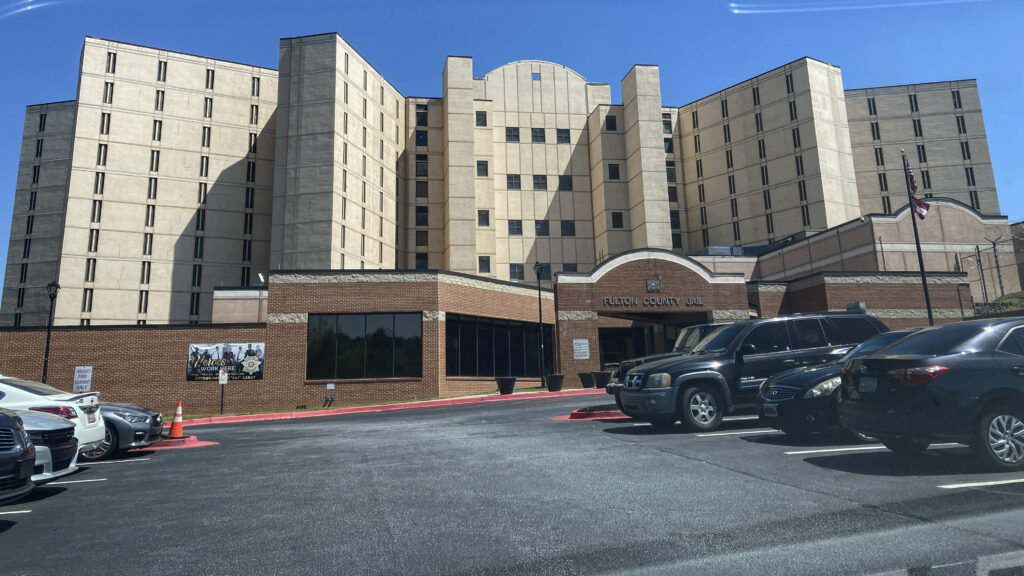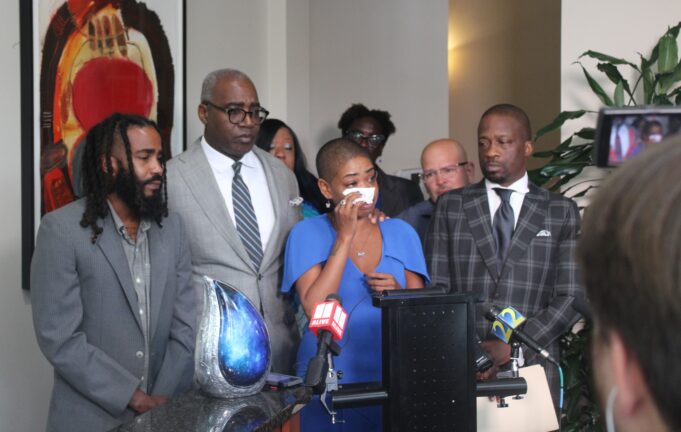ATLANTA—A month after the death of her only child, 19-year-old Noni Battiste-Kosoko, her mother, Sashu Battiste, addressed reporters at the law offices of Edmond & Lindsey in Atlanta. Placing the urn with her daughter’s remains beside her, she said, “My daughter Noni was my only daughter. She was pretty mature when she came into this world, and she left prematurely. I am completely beside myself with questions,” she said.
Surrounded by attorneys for the family and other relatives, Ms. Battiste said she needed answers. “Nobody knows what’s happening. I don’t understand why it’s taking so long to get this information. My daughter wanted to go to college,” she reflected at the August 10 news conference. “She wanted to run track.

She wanted to dance. She could sing. She could write. She was a wonderful friend. She was there for you if you needed her,” she paused. “And I need her now. And since she’s not here, I need answers to why my child is gone.”
For eight weeks, Noni was held in the Fulton County Jails system at the Atlanta City Detention Center. Held since May 20 on separate misdemeanor charges, including a failure to appear on a warrant for a misdemeanor in Miami, Florida, the teen would see her 19th birthday on July 5, while incarcerated.
She would be found six days later face down and non-responsive in her cell by officers making dinner rounds. On July 11, she was pronounced dead after Fulton County Sheriff’s Office (FCSO) deputies’ attempts to revive her failed.
At Final Call presstime, a copy of the Fulton County Medical Examiner’s report was obtained. The report lists the cause of death as “Olanzapine Toxicity,” a drug mainly used to treat psychiatric disorders. According to the report, the autopsy was conducted July 13. According to the report, superficial injuries on Noni included “Subscalp hemorrhage” and “Contusions of right leg.” The manner of death was listed as “Undetermined.”
But despite the release of the report, a number of questions still remain about the death of Noni, including why it took well over a month after her death for the report to be released. Noni also had a history of mental illness, which begs the answer to other questions, including: Why was the teen not transferred to a more suitable facility—given her medical history and the misdemeanor charges leading to her arrest?
According to published reports, her body was released to the Fulton County Medical Examiner’s Office the evening of July 11. A statement from FCSO on July 12 said that she was “found in her cell by herself with no obvious signs of injury.”

“The take home message is (that) we know nothing. We need to know something. The family needs to know something,” said family attorney Dr. Rod Edmond. “And whatever frustration and anger that you hear in the family’s voice is because of lack of information,” he charged on August 10.
“It’s an issue. This has been in the news. But then it comes near and dear in home to me,” he continued, “in that a child, who I saw one time as a baby (Noni); I get a call at age 19,” he said. “And now that there’s a lack of information, that’s why we’re here,” he told reporters.

“So, we filed or (rather) it was sent to Fulton County, what’s called an Ante Litem Notice. All that means is that in Georgia, there’s a statutory requirement that anytime that you may have a suit against the county, you’ve got to put them on notice, even sooner,” than what would be done normally. “In usual cases it’s usually a two-year statute of limitations.
But when you deal with governmental agencies, you’ve got to put them on notice sooner, so we sent that to them,” he said. “So that’s kind of basically the paper or the piece of paper that basically warrants this press conference.” Dr. Edmond and Attorney Shoafaetiyah “Sho” D. Watson, filed the legal notice Aug.9, on behalf of the Battiste family, citing possible claims for negligence and demands a $10 million settlement.
Last year, 15 inmates died inside Fulton County Jail; this year, seven have died. According to a 2022 report from the American Civil Liberties Union, the Fulton County Jail housed 515 people who remained unindicted for over 90 days, 242 who were only charged with misdemeanors, and 293 who could not pay bail.

Located on Rice Street in Atlanta, the jail is currently under a civil rights investigation launched by the U.S. Justice Department back in July. Between 2009 and October 2022, more than 60 Fulton inmates died, the highest total for any jail in Georgia during that time, according to an Atlanta Journal-Constitution investigation. Seven inmates in the custody of the Fulton County Sheriff’s Office have died this year, the sheriff’s office noted.
On July 13, the United States Department of Justice (DOJ) announced it had opened a civil investigation into the Fulton County Jail in Atlanta, Georgia.
“Based on an extensive review of publicly available information and information gathered from stakeholders, the Department has found significant justification to open this investigation, including credible allegations that an incarcerated person died covered in insects and filth, that the Fulton County Jail is structurally unsafe, that prevalent violence has resulted in serious injuries and homicides, and that officers are being prosecuted for using excessive force,” read the DOJ statement.

The investigation will examine living conditions, medical and mental health issues, use of excessive force, and protection from violence. It will also examine whether Fulton County and the FCSO discriminate against persons with psychiatric disabilities inside the jail.
“The Justice Department will determine whether systemic violations of federal laws exist and if so, how to correct them,” said United States Attorney General Merrick B. Garland in the statement.
Prior to the release of the medical examiner’s report on Noni, the demand for answers remained unmet.
“I spoke with her, and I told her to just hang in there. You have got to get through this process,” Ms. Battiste recalled as she was asked by The Final Call of her last conversation with Noni. “They are going to bring you back to Miami,” she assured her daughter.
“And we are going to run full steam ahead when you get out. And she just kept saying, I love you, Mommy, thinking that we were going to see each other again.” The Final Call will continue to follow up on this case.













